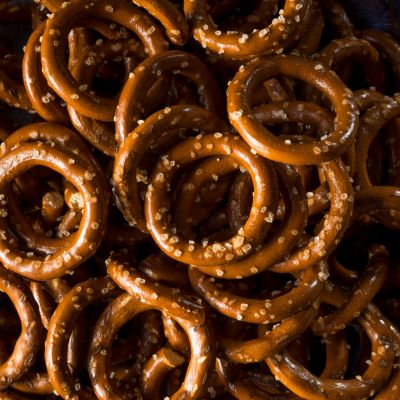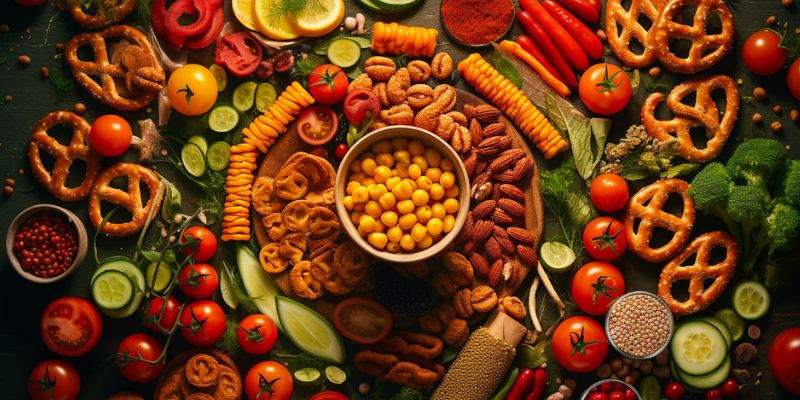Not really, although Pretzels are low in fat and calories compared to other snacks like chips or cookies.
They are a good source of carbohydrates, which can provide energy for the body.
On the downside, pretzels are high in sodium, increasing blood pressure and leading to other health problems if consumed in excess.
The healthiness of pretzels depends on how they are consumed and in what quantity.
They are a good source of carbohydrates, which can provide energy for the body.
On the downside, pretzels are high in sodium, increasing blood pressure and leading to other health problems if consumed in excess.
The healthiness of pretzels depends on how they are consumed and in what quantity.
This article will explore the nutritional content of pretzels, their potential health benefits and risks, and how they can fit into a balanced diet.
Understanding Pretzels
Types of Pretzels
Pretzels are a popular snack that comes in many different shapes and sizes. There are two main types of pretzels: soft pretzels and hard pretzels. Soft pretzels are doughy and chewy, while hard pretzels are crisp and crunchy.


Soft pretzels are typically made by boiling the dough in water that has been mixed with baking soda or lye. This process gives the pretzels their distinct flavor and texture.
Hard pretzels, on the other hand, are made by baking the dough for a longer period, resulting in a crispy texture.
Making of Pretzels
Making pretzels involves a few key ingredients, including yeast, water, and flour. Yeast is used to help the dough rise, while water is used to hydrate the dough and activate the yeast. Flour is the main ingredient in pretzel dough and can be made from various types of wheat, including white flour, whole grain flour, and whole wheat flour.
In addition to these key ingredients, pretzels are also made using baking soda or lye. Baking soda is a common ingredient used in the United States, while lye is more commonly used in Europe. Both baking soda and lye are used to give pretzels their distinct flavor and texture.
It is important to note that pretzels are not a particularly healthy snack. They are high in carbohydrates and sodium, which can contribute to weight gain and other health problems if consumed in excess. However, they can be enjoyed in moderation as part of a balanced diet.
Nutritional Profile of Pretzels
Caloric Content
100g of Pretzels contains around 370 calories
A single serving of pretzels (around 28g of hard pretzels) contains around 110-120 calories, depending on the brand and type of pretzel.
This makes them a relatively low-calorie snack option that can be enjoyed without worrying about consuming too many calories.
Protein and Fats
Pretzels don’t contain much protein and are low-fat
Regarding protein and fats, pretzels are not a significant source of either. A single serving of pretzels contains around 2-3 grams of protein and less than 1 gram of fat.
Carbohydrates and Sugars
Pretzels pack around 25g of carbs per serving but are low in sugar (as long as they aren’t topped with sugar or a sweet coating)
Pretzels are primarily made up of carbohydrates, which are an important source of energy for the body. A single serving of pretzels contains around 23-25 grams of carbohydrates with less than 1 gram of sugar.
This makes pretzels a good snack option for people looking for a carbohydrate source without consuming too much sugar.
Vitamins and Minerals
Pretzels are not a source of vitamins and minerals
While pretzels are not a significant source of vitamins and minerals, they do contain small amounts of certain nutrients.
For example, a single serving of pretzels contains around 2-3% of the recommended daily intake of iron, thiamin, and riboflavin. They also contain small amounts of copper, zinc, and vitamin E.
Health Impact of Pretzels
Sodium and Blood Pressure
Pretzels are high in sodium, which can lead to an increase in blood pressure. A high sodium intake has been linked to an increased risk of stroke, heart disease, and kidney disease.
Limiting sodium intake to less than 2,300 milligrams per day is recommended, and even lower for those with high blood pressure.
Blood Sugar and Diabetes
Pretzels are a high-carbohydrate snack that can cause a rapid increase in blood sugar levels. This can be problematic for those with type 2 diabetes or insulin resistance. It is important to pair pretzels with protein or healthy fats to slow down the absorption of carbohydrates and prevent blood sugar spikes.
Cholesterol and Heart Health
Pretzels are a low-fat snack and do not contain cholesterol. However, they are often high in sodium, contributing to high blood pressure and increasing the risk of heart disease.
Weight Management
Pretzels are a low-calorie snack but also low in fiber and protein, which can lead to increased hunger and overeating. The high sodium content in pretzels can cause water retention and bloating.
In summary, pretzels can be a part of a healthy diet if consumed in moderation and paired with other nutrient-dense foods. However, due to their high sodium content and low nutrient density, they should not be relied upon as a primary snack option.
Pretzels as a Snack
Healthy Snacking Options
Pretzels can be a healthy snack option when consumed in moderation. They are low in fat and calories, making them a good choice for those who are watching their weight. Pretzels are also a good source of carbohydrates, which provide quick energy.
For those looking for a healthy snack, it is recommended to choose plain or low-salt pretzels. These options have less sodium and are a better choice for those who are trying to limit their salt intake. Pretzels can be paired with hummus, Greek yogurt, or veggies for a more satisfying snack.
Unhealthy Snacking Options
While pretzels can be a healthy snack, some options can be unhealthy.
Flavored pretzels, such as cinnamon-sugar or chocolate-covered hard pretzels, can be high in sugar and calories.
It is important to read the nutrition label and choose options low in sugar and fat.

Other unhealthy snacking options include potato chips, crackers, and chocolate. These snacks are high in fat and calories and should be consumed in moderation. It is recommended to choose snacks that are high in lean protein or monounsaturated fat, such as nuts or peanut butter, for a more satisfying snack.
Another more healthy alternative is of course, Popcorn.
Overall, pretzels can be a good option for those looking for a quick and easy snack. It is important to choose low salt and sugar options and pair them with healthy options such as hummus or veggies.
Pretzels in a Balanced Diet
Serving Size and Portion Control
When it comes to incorporating pretzels into a balanced diet, it’s important to pay attention to serving size and portion control. Pretzels are a snack food that can be high in refined flour and salt, so it’s important to eat them in moderation. A serving size of pretzels is typically around 1 ounce, or about 10-12 mini pretzels. It’s important to measure out portions to avoid overeating and consuming excess calories and sodium.
Incorporating Pretzels in Meals
Pretzels can be a tasty addition to a balanced diet when eaten in moderation and paired with other healthy foods. Here are some ideas for incorporating pretzels into meals:
When incorporating pretzels into meals, it’s important to balance them with other healthy foods. Pair pretzels with fresh fruit or vegetables to add fiber and nutrients to your snack.
Choose whole-grain pretzels when possible, as they contain more fiber and nutrients than those made with refined flour.
Overall, pretzels can be a part of a healthy and balanced diet when eaten in moderation and paired with other healthy foods. It’s important to pay attention to serving size and portion control, and to choose whole-grain pretzels when possible.
Final thoughts 💭
Pretzels are a low-calorie snack option that is primarily made up of carbohydrates.
While they are not a significant source of protein, fats, vitamins, or minerals, they can still be enjoyed as a snack in moderation.
Frequently Asked Questions
What are the ingredients in pretzels?
Pretzels are typically made from flour, water, yeast, and salt. Some varieties may contain additional sugar, oil, or flavorings.
Are pretzels bad for heart health?
Pretzels are typically low in fat and cholesterol, which can be beneficial for heart health.
They are often high in sodium, which can increase blood pressure and contribute to heart disease if consumed in excess.
What are the nutritional facts of hard pretzels?
Hard pretzels are a good source of carbohydrates and provide small amounts of protein and fiber. They are also low in fat and sugar.
They are high in sodium, with one serving of pretzels containing up to 20% of the daily recommended intake.
Do healthy pretzel recipes exist?
Yes, many healthy pretzel recipes are available that use whole grain flour, minimal salt, and healthy fats.
Some recipes even incorporate vegetables or other nutritious ingredients.
Are soft pretzels unhealthy?
Soft pretzels are often higher in calories and fat than hard pretzels, due to the addition of butter or oil in the dough and the cooking process.
Some varieties contain more sodium and sugar than hard pretzels.
Are whole-grain pretzels a healthier option?
Whole grain pretzels are healthier than refined flour pretzels, as they contain more fiber and nutrients.





Leave a Reply